(This article contains spoilers for The Last of Us and some pretty violent images)
It was around the time I had finished burning unarmed doctors to death without hesitation. These two people were of no threat to me. I could have very easily run past them without consequence. This idea never occurred to me until after they were dead. As I ran out of the room, I realized at last the implications of what I had just done and I was forced to call my morality into question.
Video games are the most exciting story-telling medium because of their ability to involve the player. While a book, movie or TV show must needs keep you at arm’s length, a game invites you to be an active part in its story. You become far more likely to emphasize with the protagonist because you, in a sense, are the protagonist.
Best of all is when a video game can make you complicit. This is something The Last of Us accomplishes ruthlessly. This game leads you down the garden path with its familiar tropes and trappings, only to pull the rug from beneath your feet. It was a shock to discover that I was not the hero. It was even more shocking that it took me burning two unarmed doctors to death before I figured that out.
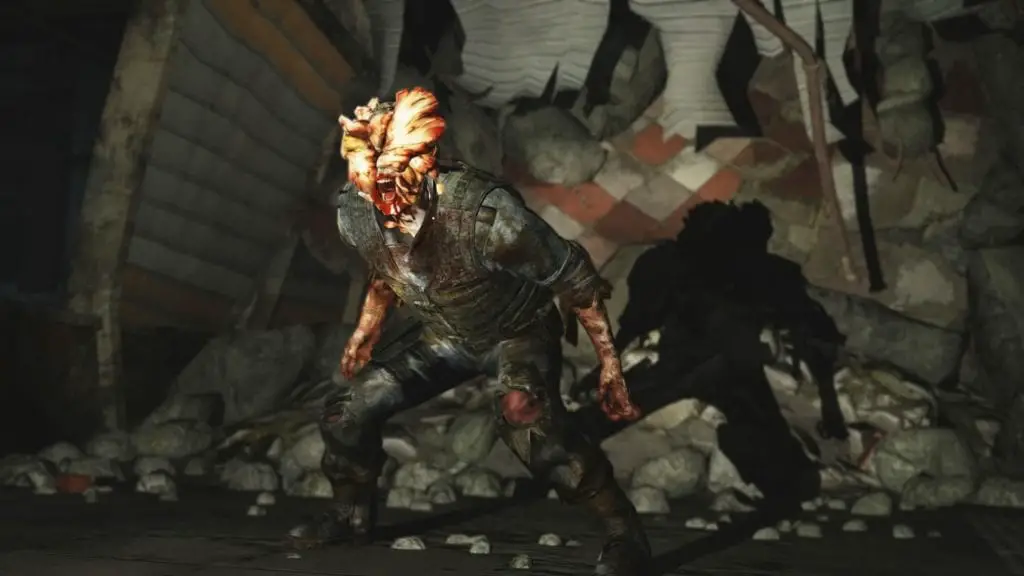
A Dying Species
The bulk of The Last of Us takes place twenty years after society collapsed. Infectious fungal spores began turning people into monstrous ‘clickers’, zombies in all but name. Military forces control the last few cities standing, and a rebellion against their authoritarian rule is being fought by a group called the Fireflies.
So far, so generic. The setting of The Last of Us is hardly unique, mainly serving as a backdrop for the story to take place. The story needed an apocalypse, so the writer’s cooked up an apocalypse. The important point to take away is that humanity is on its last legs and no salvation is in sight.
Enter Ellie (Ashley Johnson). A teenager born into this hellish world, she discovers that she alone is immune to the infection. Fate makes it so an ageing smuggler named Joel (Troy Baker) is tasked with taking her across the country. There they hope to find a group of medically proficient Fireflies who will create a vaccine based on Ellie’s immunity.
Everything is set up for a very typical kind of story. Brave white man is tasked with defending a young girl, finding redemption and ultimately saving the world. Everyone has seen a dozen movies like this and played a dozen games with exactly this set-up. One assumes Joel must be the hero. After all, he is going to save the world, right?
Dead Kids
(I promise this is my last subheading featuring a variation on the word ‘death’).
Before we get to meet Ellie, we spend a good ninety minutes in Joel’s company. It is through his eyes we see the collapse of society in 2013. It is through his eyes we first experience the hellish existence that is 2033. He proves himself cynical, ferocious and utterly determined to survive. Notice that these descriptions do not exactly make Joel sound like much of a hero. One would probably figure out where this was going much sooner if his daughter did not immediately die.
Joel’s daughter Sarah is killed on the night of the outbreak in 2013. Ironically, she is not killed by a clicker, but rather by a young soldier ordered to enforce a quarantine. This is part of a recurring theme that it is humans who are the most terrifying monsters of all (a theme reinforced, accidentally or not, by humans being much harder to fight than clickers). It is a pretty sophomoric point, but important for where Joel’s story will go.
Sarah’s death is absolutely heart-breaking. The player is tasked with protecting her from the very outset, only to have control ripped away from them at the most crucial moment. Never again, we are asked to vow to ourselves. Never again will we let our virtual daughter die. By the time we meet Ellie we are fully prepared to do anything to keep her from harm.
Which leads me to a very important point, one that serves as the crux of my interpretation of both this game and (weirdly enough) Life is Strange: Being prepared to do literally anything to protect the people you love is the sign of a bad person.
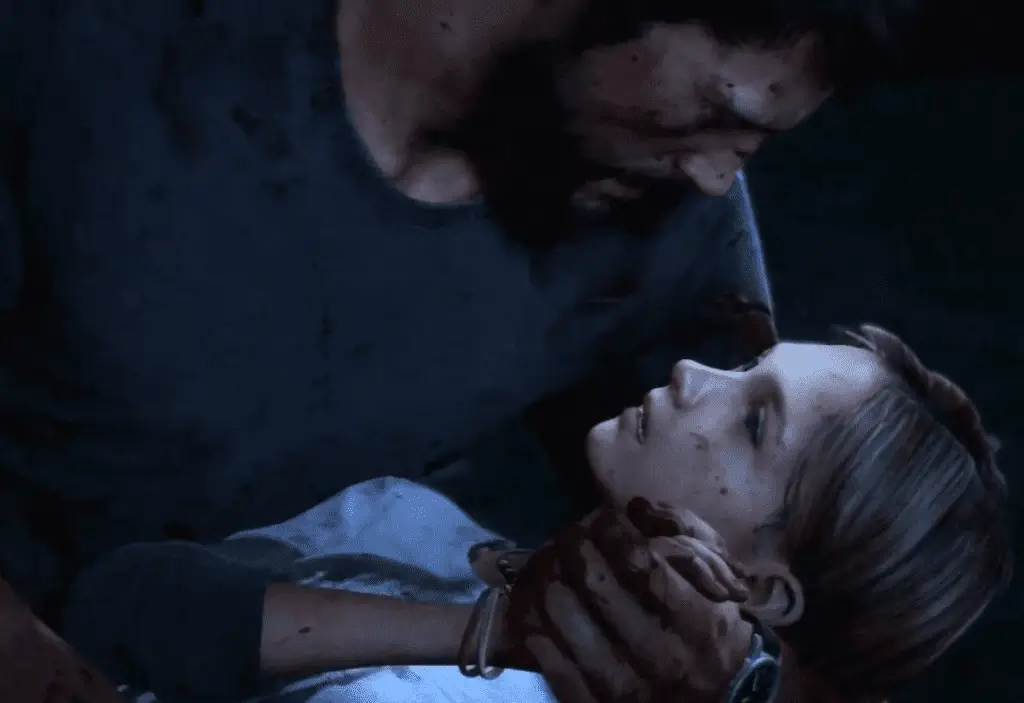
Ludonarrative Dissonance
Before I go any further, I need to talk about a certain issue that plagues a lot of video game story-telling. Ludonarrative dissonance is a term in reference to a conflict between gameplay and story-telling. If you were playing a game where the main character is established as being a pacifist, but you end up spending the bulk of the game running around murdering people, you would be experiencing some ludonarrative dissonance.
One game series commonly held up as an example is Uncharted, which is also a product of Naughty Dog, the same developer who made The Last of Us. Its main character, Nathan Drake, is supposed to be a lovable wise-cracking rogue. He is essentially presented as what would happen if you cast Nathan Fillion as Indiana Jones.
And in Uncharted 2, the best game in the series, he kills 1,000 people. Remorselessly.
There is no good explanation for this in-universe. There is no suggestion that Drake is secretly a monstrous killing machine. We are clearly supposed to think of him as an easy-going hero, yet he murders so very many people without a second thought. The only possible explanation is that the Drake of the story and the Drake of the gameplay are two different people, the purest example of ludonarrative dissonance.
When Naughty Dog began to make The Last of Us, I suspect this criticism of Uncharted was fresh in their minds. I think they intended to do the opposite of what they had done in the past. The Joel of the story and the Joel of the gameplay are the same person. Once you accept that idea, a whole new perspective on the game begins coming to light.
Last Man Standing
How exactly did Joel survive the apocalypse for twenty years? No one ever expressly states it, but the implication that he has a very shady past by the time he meets Ellie is hammered home repeatedly.
For example, after Joel and Ellie are ambushed while driving, Ellie asks him how he knew the supposedly injured man begging for help was actually faking so that he and his group could steal their car. Joel’s answer?
Joel: “I’ve been on both sides.”
Lovely implications there. Now how about this exchange between his younger brother Tommy and him about their time together surviving in a big city.
Tommy: “I got nothing but nightmares from those years.”
Joel: “You survived because of me.”
Tommy: “It wasn’t worth it.”
Or this one with his smuggling partner Tess (and possible lover) about their history when she sees a possibility for redemption.
Tess: “Guess what, we’re shitty people Joel, it’s been that way for a long time.”
Joel: “No, we are survivors.”
Survival is Joel’s main priority. Survival is the be all and end all. It is the cause he falls back on when questioned about his actions. It is his sole justification for his frequently horrifying actions. This is where the absence of ludonarrative dissonance really starts to hammer the horror home. Every time Joel mercilessly beats someone to death, the game is not pretending he is a charming rogue. Rather, it is clearly demonstrating what form ‘surviving’ has taken for Joel.

David
After an horrific injury puts Joel out of commission, Ellie briefly becomes the player character. While hunting a deer she crosses paths with David (Nolan North). He offers to provide her with the anti-biotics she needs to safe Joel’s life. He comes across as a reasonable person, charming even, a small bastion of decency in a nightmarish world. David and Ellie even prove to be as good a fighting team as her and Joel.
However, is slowly transpires that David is perhaps the worst person who has ever existed. He is literally all the worst things a person can be: A murderer, a pedophile, a cannibal and a rapist. This is a man who ultimately prioritizes stalking Ellie with a hunting knife rather than escaping the building they are in as it slowly burns to the ground.
Okay, so David is the worst. Why am I bothering to bring him up? Again, I want to reinforce how charming he initially appears to be. That the very worst human being in the game initially appears to be the nicest. The lesson here is clear; Ellie was taken in by a man who claimed to have her best interests at heart and was ultimately forced to kill him with his own knife.
Which serves to make us wonder whether or not there are any other violent men around who claim to have Ellie’s best interest at heart. David is not a foil to Joel, but rather a slightly darker reflection of him. Ironically enough, while Joel is a better person than David, he will end up committing a worse act than anything David could ever have comprehended.
Finally it is time to talk about the doctors I murdered.
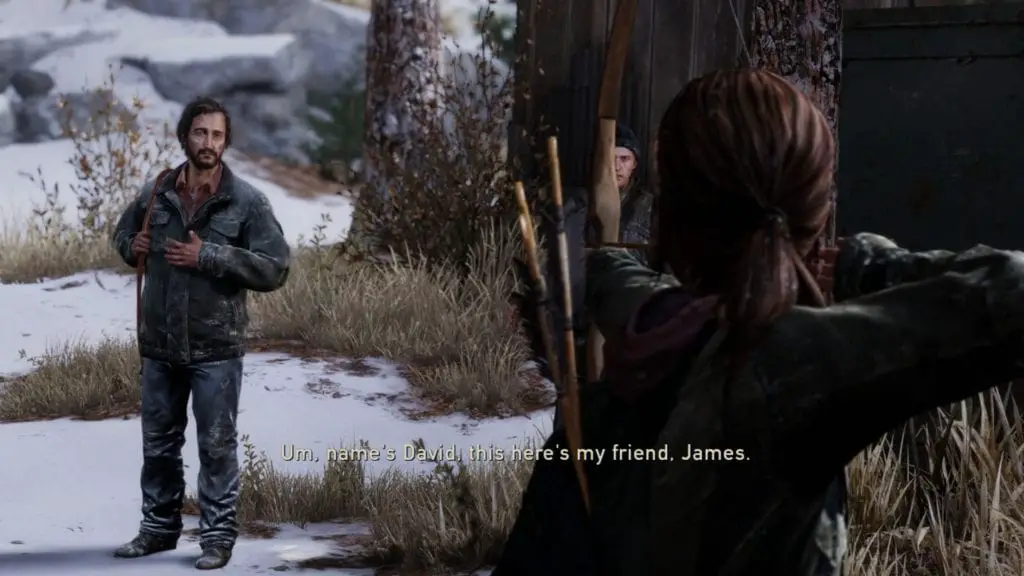
Worth It
Ellie: “After all we’ve been through.
Everything that I’ve done.
It can’t be for nothing.”
Joel has killed a lot of people. He has engaged in some very questionable actions to survive. He even resorted to torturing David’s men while trying to find Ellie. It is no accident that David’s men end up fleeing from him when they see him coming. To them he is a crazy men determined to kill them all. Are they wrong?
The only possible justification for any of this (and I am not saying I agree, I am just saying it is the only argument that I will not dismiss outright) is that Joel had to do these things because he is trying to save the world. Everything he did was to protect Ellie so that they could reach the Fireflies and a vaccine could be created. Surely we must forgive Joel his violence if the result is the salvation of humanity?
The above quote suggests that is Ellie’s view on the whole thing. The idea that they are going to save the world is the only thing that keeps her going after her traumatic ordeal with David. Reaching the end of this journey will make the entire thing worth it.
And they do finally make it to the Fireflies. And Ellie’s immunity really can be turned into a vaccine. Hurray and huzzah, the world has been saved! There is just one small problem. The fungus that turns people into clickers grows on the brain. To extract the cure will mean cutting open Ellie’s brain.
Ellie has to die for the world to be saved.
Literally Anything
Joel begins the game by losing a daughter. He spends the majority of the game slowly coming to think of Ellie as his daughter. He has gone to extremes to protect her from harm. Joel has decided, just like the player did as he cradled Sarah’s corpse in his arms, that he would do literally anything to protect the one he loves most.
In this case, that means dooming the entire human race. And Joel does not even blink.
As Joel tortures a Firefly soldier for information, consider how many times he has relied on torture in the past. As Joel relentlessly slaughters every last Firefly in his way, consider that maybe David’s men were right to flee from this crazed murderer. As Joel stabs a doctor with his own scalpel, consider that he has just murdered someone who was essentially humanities last hope.
I did not consider any of this on my first play through. Too caught up in the moment perhaps, too determined to finish the game, too desperate to save Ellie. I turned to the two unarmed doctors cowering in the corner and lit them on fire with my flamethrower. I did not even blink. In that moment, I had become Joel.
Afterwards, as I watched Joel execute an unarmed black woman, I felt hollow. All sense of achievement was gone. Joel had doomed humanity and I had helped him do it. Worst of all, I had wanted him to do it. I prioritised protecting Ellie over everything else. I felt like a monster.
The game was not finished with me yet.
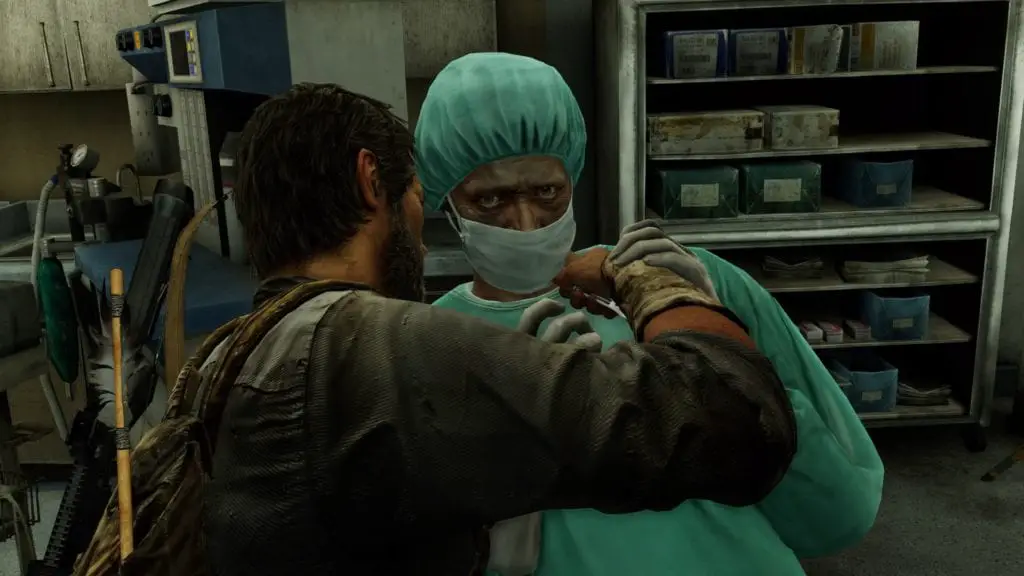
The Lie
The final scene begins with us once again controlling Ellie. Given that we do nothing but walk for a couple minutes and climb a ledge, why does the game bother giving us back control? The aim is to imply distance in the relationship between Joel and Ellie, a distance that Joel is solely responsible for creating.
See, Joel did not tell Ellie what really happened at the hospital. Instead, he told her that there were dozens more people immune like her, that a cure was impossible and that there was no point in sticking around. He does mention the massacre he precipitated. He lies to her, and she knows that’s what he is doing.
So as we walk in Ellie shoes, we feel uncomfortable in Joel’s presence for the first time. He starts talking about how he and Sarah used to take hikes, just like he and Ellie are doing at that moment. He says that Sarah and Ellie would have been great friends had they ever met. Joel has very clearly decided Ellie is the replacement daughter that the world owes him and he is doing very little to hide that fact.
Ellie tries to explain what their journey has done to her, and Joel talks about the only thing he knows how to talk about.
Joel: “I’ve struggled for a long time with surviving. No matter what… you keep finding something to fight for. Now, I know that’s not what you want to hear right now, but it’s…”
Ellie: “Swear to me. Swear to me that everything you said about the fireflies is true.”
Joel: “I Swear.”
Ellie: [after a long pause] “Okay.”
When given a last chance to come clean, Joel chooses to lie. Ellie knows he’s lying, knows she’s trapped with this murderous lunatic who has doomed the entire species. If it wasn’t clear before, it should be evident now.
Joel was not the hero of this story. He was the villain.
Intent & Interpretations
On the other hand, I might be wrong.
No one ever says that in a critique, do they? Look, I am pretty sure my interpretation of the game is solid, though I acknowledge I might be overlooking or underplaying some details. When I worry that I might be wrong, my concern is that Naughty Dog did not intend to tell the story that I think they ultimately ended up telling.
My motivation to write this whole thing was the announcement of The Last of Us Part II, a direct sequel to the game that will once again star Ellie and Joel. Straight away this was cause for concern, given that both of their stories have already definitely and definitively ended. Even worse is the implication of the trailer that the sequel will be about Ellie seeking revenge for something. I hope they surprise me, but right now it feels like we will get one of those by the numbers sequels that mainly serves to cheapen the memory of the original.
It is entirely possible that the writers of this game intended for Joel to be an anti-hero. These are the same developers who accidentally made Nathan Drake a mass murderer after all. If that was their intent, then the visual of a white man executing a black woman takes on a whole host of horrible implications. I can only hope they intended said visual to inspire horror, rather than some kind of triumph.
Maybe I just want to believe that they were trying to tell a complicated story that played with player character bias. I do believe that was the intent, but the sheer amount of people who view the game so very differently to me gives me reason for concern.
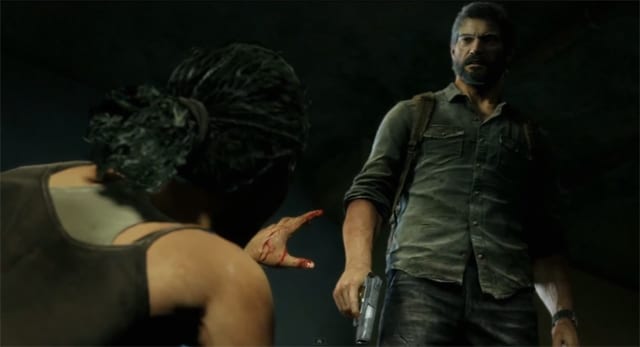
Conclusion
The Last of Us is not a perfect game (ironically Naughty Dog have struck perfection once before, with Crash Team Racing, the best game ever made). A perfect game is not a term I use lightly; Silent Hill 2 and Undertale are perhaps the only others I would bestow the accolade upon.
Despite all the accolades it received upon release (not to mention my fondness for it), this is not a particularly ground-breaking game either. Its gameplay is a very strong version of an unoriginal third-person template. It avoids experimentalism at every turn. It does still star an angry white man who kills lots of people.
However, a work of art can be both flawed and perfunctory, yet still reach classic status. The Last of Us tells a simple story very, very well. Its pacing is almost without comparison. Its emotional moments hit hard.
Running beneath it all is a very subtle critique of the often casual relationship between video games and violence. This critique is masked by a trope enforced expectation that protecting Ellie will be Joel’s redemption. We are trained to expect Joel to get better as the story progresses. Instead fate putting him into a parental situation again marks the last break in his psyche.
Joel wakes up in 2033 a bad man and finishes the game a violent lunatic. Too often we are allowed to act like lunatics and still see ourselves as the hero. There is an absence of triumph in The Last of Us. There never was an opportunity to save the day, because we were never this story’s hero. Instead, we were trapped playing the villain.
All images courtesy of Naughty Dog.

